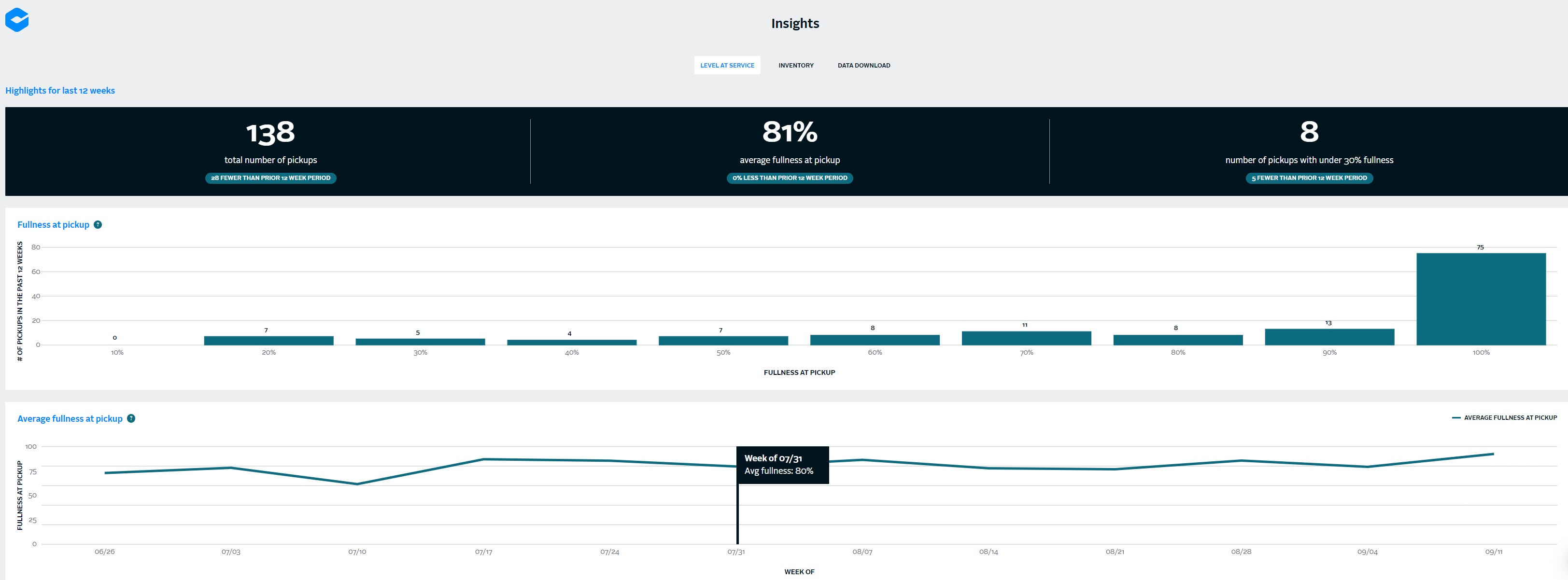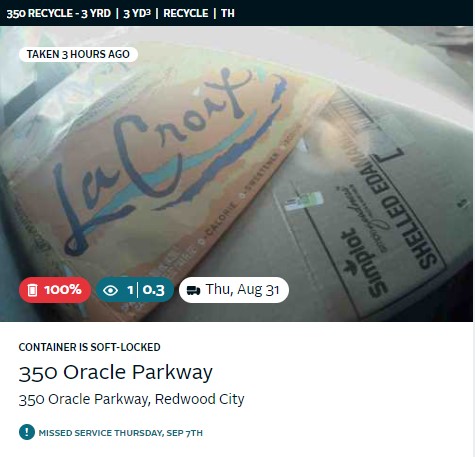Oracle’s Redwood Shores office is always looking for ways to improve operational efficiency while honoring its commitment to sustainability. Aligned with Oracle’s environmental policy and commitment to continuously identify opportunities to divert, minimize, reuse, and recycle our waste stream, the Redwood Shores real estate and facilities team focused on examining its waste management practices. This meant taking a closer look at waste bin capacity and efficiency of bin collection services.
Proper waste stream sorting can improve diversion rates (the rate of waste diverted from landfills), increase service cost savings, and prevent the risk of cross-contamination and associated fees from the waste hauler for improper recycling and composting practices on campus.
To capitalize on this, the Redwood Shores real estate and facilities team invested in an innovative waste management technology, a solution offered by Compology, the world’s largest waste and recycling smart metering technology company, to increase efficiency, avoid unnecessary pickups (reducing greenhouse gas emissions), and yield significant cost savings.
At the end of 2020, the team piloted Oracle’s own Smart Waste Cameras Program around campus at an initial investment of $5,500, which included hardware and a one-year software subscription plan to Compology’s analytics platform, with the goal to optimize waste collection and waste management and increase Redwood Shore’s composting and recycling rates.
What is Compology and how does it work?
Compology provides a waste management solution that analyzes the content of waste containers using video observation and artificial intelligence. The Compology cameras and sensors capture data on waste containers and provide near real-time monitoring, and analytics on an online platform such as in-container images, container fullness measurements, GPS location tracking data, container servicing verification, and content analysis.
In the last three years, Oracle Redwood Shores has been able to report a total of 153 missed pick-ups by the waste hauler. The team rescheduled 131 of those missed pick-up requests. For the remaining missed pick ups that could not be rescheduled, refunds were awarded for more than $10,000.00 (USD). If the waste hauler misses the pick up, Oracle still covers the cost, this is why corrective pickups are important to track as they ensure the service is delivered. Additional savings were achieved by strategically adjusting the frequency of pick-ups and the size of the containers for each waste stream, using data from Compology’s analytics dashboard.

The benefits of having cameras installed inside the waste containers are numerous and help Oracle Redwood Shores identify contamination, ensure that waste/garbage bins are serviced properly, reduce carbon emissions by decreasing service frequency, and provide cost savings.

Additional benefits of data-enabled waste management:
- 24/7 near real-time access to waste data
- Reporting accuracy on sustainability KPIs
- Tangible steps towards achieving corporate sustainability goals
- Potential 30-40% cost savings on annual waste hauler invoices, based on Compology client case studies*
- Data-driven container right-sizing and efficient frequency of pick-up schedule
- Reduced risk of penalty fees
- Waste hauler accountability and oversight if they adhere to the agreed pick-up schedule
- Janitorial staff accountability for correct separation and disposal of waste
Project History and Future
In 2021, ten Compology AI cameras were installed across the Oracle Redwood Shores campus, as a pilot program. Waste management patterns were identified within 6-8 weeks of the camera installation. The facilities team was able to identify locations of frequent contamination and key contaminants in each waste stream, waste hauler frequency of pick-up and accuracy of service, and inefficient container size. This meant that if the waste bin was not at least 50-60% full, there was no need for a pick-up, thus creating cost and greenhouse gas (GHG) emissions savings by preventing unnecessary service by the waste hauler.
In the first few months since the launch of the program, the data collected from Compology reported 68 not serviced pick-ups by the waste hauler, which resulted in 55 rescheduled pick-ups and more than $3,000.00 (USD) in refunds for the remaining 13 unresolved missed pick-ups. The program reached its investment break-even time (BET) in less than a year and achieved a return on investment (ROI) of 7% in its first year.

Since then, the program has expanded and Compology sensors are now in twelve waste containers on the Redwood Shores campus. On average the Redwood Shores facilities team records more than 30 not serviced pick-ups, 60 rescheduled pick-ups, and an average savings of $3,500.00 (USD) per year on reported not serviced by waste hauler pick-ups alone.
The program has been so successful that the Redwood Shores campus will be installing three additional cameras this fiscal year to cover all waste stream containers. By having complete oversight of waste management practices on campus, the team is forecasting a possibility to achieve between $4k – $9k of additional cost savings by the end of the year, depending on the accuracy of pick-up service, as well as eliminate trash overflow alerts and finalize optimizing the pick-up schedule for all waste containers on campus.
Conclusion
Through smart cameras, Oracle Redwood Shores takes the guesswork out of waste management and allows for the preparation and adjustment of services in unpredictable times. Remote AI monitoring opens the door to significant cost reductions, and more efficient services while pushing Oracle one step closer to achieving its 2025 sustainability goal of reducing waste to landfill by 33% per square foot of commercial real estate.
*Estimate. Based on case studies of more than 200 Compology customers across USA, Canada, and Mexico over an 8-year period.
